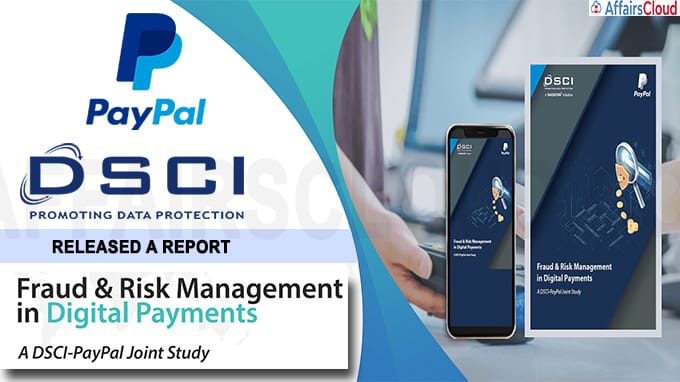 The Report, “Fraud & Risk Management in Digital Payments” has been jointly developed by The National Association of Software and Service Companies (NASSCOM)’s Data Security Council of India (DSCI) and PayPal Payments Pvt. Ltd. (PayPal). The report gives a glimpse of growth of frauds and payment scams. It is to be noted that Online banking and digital transactions has massively grown in India due to Lockdown(COVID-19 pandemic), however, the threat landscape has also grown dynamically. The report attempts to address the emerging concerns and underlying causes.
The Report, “Fraud & Risk Management in Digital Payments” has been jointly developed by The National Association of Software and Service Companies (NASSCOM)’s Data Security Council of India (DSCI) and PayPal Payments Pvt. Ltd. (PayPal). The report gives a glimpse of growth of frauds and payment scams. It is to be noted that Online banking and digital transactions has massively grown in India due to Lockdown(COVID-19 pandemic), however, the threat landscape has also grown dynamically. The report attempts to address the emerging concerns and underlying causes.
Report Released in a virtual event
On August 26, 2020, in a virtual event the DSCI-PayPal report was released by Lt. Gen (Dr) Rajesh Pant, National Cyber Security Coordinator, Government of India (GoI) in the presence of K. Rajaraman, Addl. Secretary, Dept. of Economic Affairs, Ministry of Finance.
Highlights of the Report
Current Indian Scenario
i.The E-commerce market is anticipated to grow from USD 50 billion(in 2018) to USD 200 billion by 2026.
ii.It is expected that the internet user base will grow to 835 million by 2023 from 560 million in 2018.
iii.Growth of online shoppers- 73% for tier-I and 400% for tier-II and tier-III cities.
iv.As of March 31, 2019, 925 million debit and 47 million credit cards have been issued in India, 2nd to China.
v.The MSME’s adoption of digital channels and transformation have doubled when compared to their peers using traditional approaches and is vulnerable to cyber security threats.
vi.In line with the vision of Digital India, digital payments are on a rapid growth path with National Payments Corporation of India (NPCI)’s UPI alone having a 1.49 billion in volume and USD 41 billion in transaction value, in July 2020.
vii.To introduce better user experience, the retail sector is increasingly advancing progressive Artificial Intelligence(AI) technologies like, machine learning, computer vision, conversational AI, Data Science and Natural Language Processing(NLP).
viii.As per the prediction of Reserve Bank of India(RBI) the digital transactions will increase from Rs 2069 crore (about USD 280 million) in December 2018 to Rs 8707 crore (approximately USD 1178 million) by December 2021.
Key Info
The report covers the following, namely:
Types of Fraud
Types of online payment fraud from buyer side, merchant side and cyber security frauds. It also shows recent fraud case studies with their modus operandi.
Key Challenges
Fraud detection, enforcement, investigation and legislative challenges; Lack of multilevel awareness; Cross-industry or expertise collaboration; Security is seen as a cost overhead and not essential investments by stakeholders; Privacy laws; Organised criminal involvement
Preventive Measures to fraud and Upcoming Tech for Recovery
IP Geolocation, Rules Engines, Proxy IP address detection, Machine Learning ,Automated Workflow, Insights Dashboard, Device Fingerprinting.
Possibilities of Future Fraud
i.Deceiving the current fraud prevention & detection mechanisms which rely on control parameters like: location information; device identifiers like IMEI, MAC address; goods/services identities like SKUs/Barcodes
ii.Hacking the supply chain vulnerabilities at system & human process interchange and the risk transfer controls like buyback, insurance settlement of earlier transactions
Recommendations
Recommendations are given separately to Retail Industry, Payment Industry, Policy Makers/Regulators, Law Enforcement Agencies and Consumers.
Click here to have a full view of Report
Recent Related News:
i.According to the report titled “Policy Brief: The Impact of COVID-19 on Food Security andNutrition” released by Italy based Food and Agriculture Organization (FAO), around 45 million people were fall into acute food insecurity since February 2020 due to of the novel coronavirus (COVID-19) pandemic, of which a majority of 33 million people reside in South and Southeast Asia, and most of the remainder in Sub-Saharan Africa.
ii.In accordance with the first ever report on illegal wildlife trade (IWT) titled “Money Laundering and the Illegal Wildlife Trade” report by Financial Action Task Force (FATF), illegal wildlife trade is a “global threat” which generate estimated revenues between $7to $23 billion a year. This crime could lead to more zoonotic diseases in the future.
About DSCI:
Headquarters– Noida, Uttar Pradesh
CEO– Rama Vedashree




